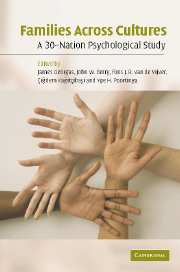Book contents
- Frontmatter
- Contents
- List of figures
- List of tables
- List of contributors
- Acknowledgments
- Prologue
- Part I
- 1 Families and family change
- 2 Cross-cultural theory and methodology
- 3 Theoretical perspectives on family change
- 4 Family portraits from 30 countries: an overview
- 5 Hypotheses
- 6 Methodology of the study
- 7 Results: cross-cultural analyses of the family
- 8 Synthesis: how similar and how different are families across cultures?
- Part II
- Appendix
- References
- Index
3 - Theoretical perspectives on family change
Published online by Cambridge University Press: 10 December 2009
- Frontmatter
- Contents
- List of figures
- List of tables
- List of contributors
- Acknowledgments
- Prologue
- Part I
- 1 Families and family change
- 2 Cross-cultural theory and methodology
- 3 Theoretical perspectives on family change
- 4 Family portraits from 30 countries: an overview
- 5 Hypotheses
- 6 Methodology of the study
- 7 Results: cross-cultural analyses of the family
- 8 Synthesis: how similar and how different are families across cultures?
- Part II
- Appendix
- References
- Index
Summary
In this Chapter we will examine family dynamics and change from a cross-cultural psychological perspective. The main focus will be on family change within changing global social structural and ecocultural contexts. Following the previous Chapter, however, we will start by examining the current Western family with a sociological orientation, for it is the Western family that has served as a prototype for family research in sociology. We will then devote most of our attention to the non-Western family, both in the Majority World and also as immigrant in the Western countries, and try to depict patterns of change that can be explained with a comparative orientation and from an ecocultural perspective. There will also be a presentation of a Model of Family Change (Kağıtçıbaşı, 1990, 1996a) that has proven useful in understanding family patterns in relation to different ecocultural contexts and changes in these.
FAMILY RESEARCH AGENDA: THE WESTERN ECOCULTURAL CONTEXT
Even a cursory glance at current scholarship on the family brings forth an interesting, even ironic dilemma. While there is a concern regarding the current state and the future of the Western family, which is claimed to be on the decline, at the same time there is a tacit assumption that the family in the non-Western (Majority) world is shifting toward the Western model. As discussed in Chapter 1, this is the main thesis of modernization theory that permeates social science thinking and everyday parlance, even though it has been questioned ever since its inception in 1960s (Bendix, 1967; Gusfield, 1967).
- Type
- Chapter
- Information
- Families Across CulturesA 30-Nation Psychological Study, pp. 72 - 89Publisher: Cambridge University PressPrint publication year: 2006
- 17
- Cited by

